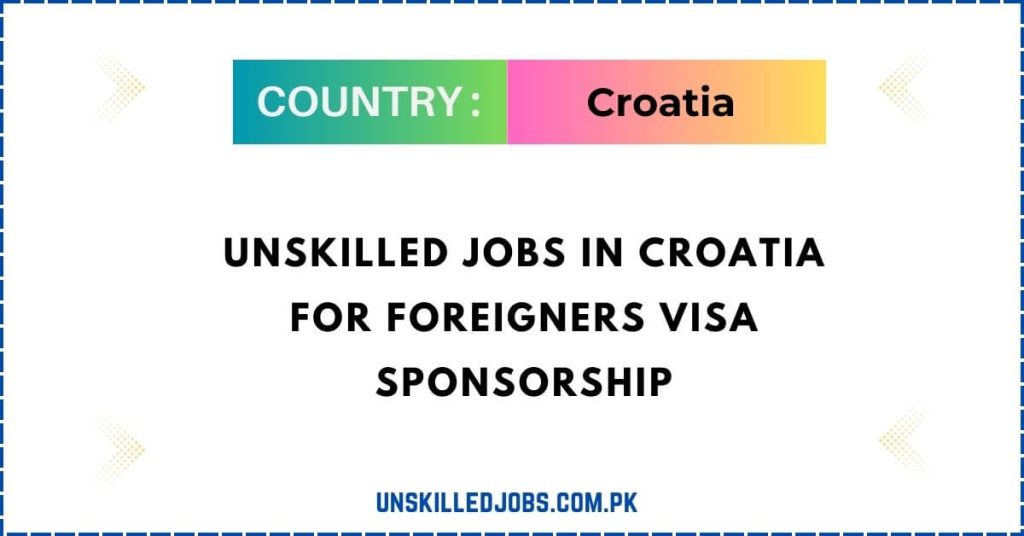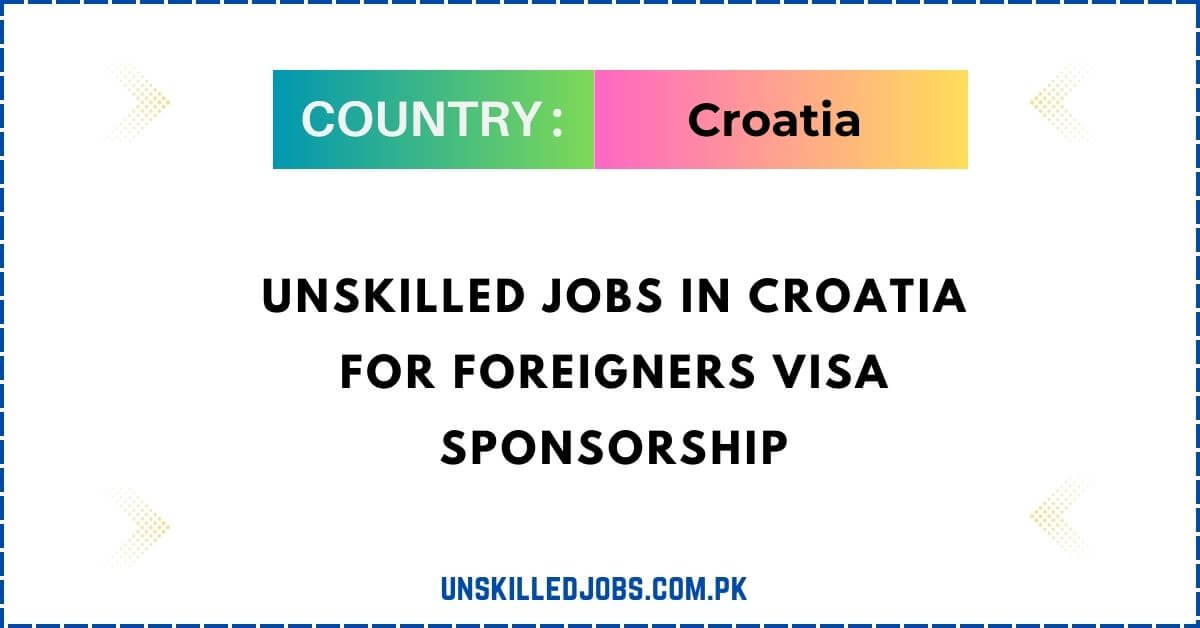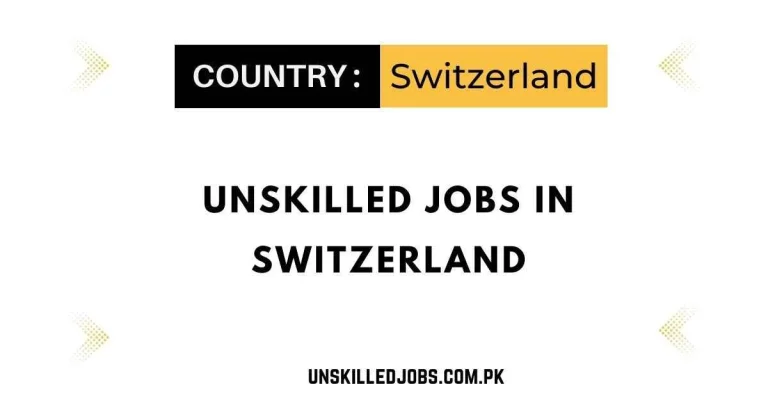Unskilled Jobs in Croatia for Foreigners Visa Sponsorship
In recent years, Croatia has become a famous place not only for tourists but also for people from other countries looking for work. Croatia is a unique mix of natural beauty and urban charm, thanks to its beautiful coastline, historic cities, and rich cultural history. Foreigners who want to work in Croatia can find jobs that don’t require a lot of training. These jobs often come with visa support. In this piece, we’ll talk about the different types of low-skill jobs that foreigners can get in Croatia and how to get a visa sponsored.
Understanding Unskilled Jobs
Most jobs that don’t require a lot of skills don’t require special training or certificates. They often require a lot of work and can include industries like hospitality, gardening, and manual labor.
Why choose Croatia?
Before we talk about the different job choices, let’s talk about why Croatia is a good place for foreign workers. The country has a Mediterranean temperature, a low cost of living, and a friendly environment for people who want to move there.
Unskilled Jobs in Tourism
Hotel and Restaurant Staff
The tourism business in Croatia is doing well, and this means that there are a lot of jobs in hotels and restaurants. People often want to work as waiters, bartenders, housekeepers, and cooking staff.
Tour Guides
If you are interested in history and culture, it can be satisfying to work as a tour guide in Croatia. Many people go to Croatia to learn about its rich history, so guides who know their stuff are always in demand.
Seasonal Farm Work
There is a need for seasonal farm workers during the busiest times for farming. This is a great choice if you like working outside and don’t mind living in the country.
Benefits
- Visa Sponsorship Opportunities:
- Jobs that don’t require a lot of skills that need workers may offer visa support to bring in foreign workers. This could be a great chance for foreigners who want to officially live and work in Croatia.
- Cultural Experience:
- A unique way to fully experience the culture of Croatia is to work in a poor job there. People can have a more real experience because they communicate with people every day.
- Language Acquisition:
- Working as a low-skilled worker can help you learn a language, especially if you have to talk to people on the job all the time. This language improvement can help you at work and in your daily life.
- Cost of Living:
- Croatia is known for having a cheaper cost of living than some Western European countries. Some low-skilled jobs may pay enough to cover your living costs and give you the chance to see how people live in a beautiful country.
- Networking Opportunities:
- Taking on low-skilled jobs gives you the chance to meet people from different areas and build your network. Making new connections in your area can help you make friends, find work, and learn more about the community.
- Flexibility in Job Market:
- When it comes to hiring, less-skilled jobs usually have less strict rules. People from other countries who are ready to work hard but don’t have specific skills or qualifications may benefit from this flexibility.
- Entry Point for Career Progression:
- People may try out different career paths, gain useful work experience, and find skill-building opportunities while starting out in an unskilled job. Getting this experience can help you move up in your job.
- Diverse Work Environments:
- There are unskilled jobs in many fields, so the work settings are varied. People can learn about different parts of the Croatian economy by working in the service, farm, or hospitality industries.
- Gaining a Work Ethic:
- Practical chores and hard physical work are common in low-skilled jobs. Doing this kind of work can help you build a strong work ethic, discipline, and resilience, all of which can be useful in any future job.
- Community Integration:
- People can become part of the community by working in low-skilled jobs. As foreigners become part of Croatian culture, this can make the experience more fulfilling and enriching.

Construction and Manual Labor
Construction is a big business in Croatia, and there is always a need for people who can do physical work. Those with the right skills can find work in the building, whether it’s carpentry, masonry, or general construction work.
Language Teaching
The tourist industry in Croatia, in particular, needs a lot of people who can speak English. If you speak English well or are a native speaker, you might want to think about becoming an English teacher.
Read More: Visa Sponsorship Unskilled Jobs In UK – Apply Now
Requirements for Foreign Workers
Before you pack your bags and move to Croatia, you need to know what the rules are for people from other countries who want to work there. This means having a legal work visa, health insurance, and being registered with the local government.
- Tourism and Hospitality: People who work in tourism and hospitality are in high demand because Croatia is a famous place for tourists to visit. This includes hotel staff, housekeepers, and event staff. Visa funding is often available for these jobs, especially in places with a lot of tourists.
- Construction and Manual Labor: Croatia’s construction business is strong and always needs workers for a variety of roles, such as general laborers, carpenters, and masons. Because of the high demand for workers, companies in this field often pay for visas.
- Agriculture: Seasonal work in agriculture, like picking fruit and working on farms, is another place where foreigners can get work with a visa. People in rural places can usually find these jobs, which are very important during harvest time.
- Caregiving: More and more people need help taking care of kids and older people. There are lots of jobs available, like nannies, personal care aides, and people who help take care of the elderly. Most of the time, companies will pay for your visa.
- Logistics and Warehousing: There are also a lot of jobs in logistics, like warehouse workers, delivery drivers, and truck operators. Because these jobs are important to many industries and support the supply line, they are more likely to be sponsored for a visa.
Applying for a Work Visa
Required Documents
To get a work visa, you’ll need things like a letter of offer from a Croatian company, proof that you have a place to live, and a certificate that says you don’t have a criminal record.
Visa Application Process
It can be hard to figure out how to get a visa, but with the right paperwork and patience, it is possible.
Living and Working in Croatia
After you find a job and get a work visa, it’s time to settle down in Croatia. This part tells you how to find a place to stay, how much it costs to live there, and how to fit in with the local culture.
Challenges and Tips
Working in a different country can be hard in some ways. We’ll talk about common problems that tourists have in Croatia and how to solve them.
Conclusion
Croatia is a welcoming place for foreigners looking for low-skilled jobs because of its natural beauty and job possibilities. With the right attitude and hard work, you can make a good life in this beautiful country.
Frequently Asked Questions
How do I find job listings for unskilled positions in Croatia?
Job listings for unskilled positions in Croatia can be found on various online job portals, local classified ads, and the websites of Croatian companies. Additionally, you can reach out to local employment agencies or networking groups for leads on job openings.
Are there language requirements for obtaining a work visa?
The language requirements for obtaining a work visa in Croatia can vary depending on the job and the employer’s preferences. Some jobs, especially in the tourism sector, may require proficiency in English, while others may not have strict language requirements. It’s essential to check the specific language requirements for the job you’re interested in.
Sara Thomas is an accomplished author and a leading expert in unskilled jobs and opportunities for newbies. With a passion for empowering individuals with limited experience, she has dedicated her career to providing valuable insights and guidance for those seeking entry-level positions in various industries.







